Key takeaways:
- Reparations politics involves complex emotions and discussions about historical injustices, privilege, and societal responsibility.
- Historical examples of reparations highlight the need for acknowledgment and addressing economic disparities resulting from past wrongs.
- Arguments for reparations emphasize justice, moral responsibility, and the necessity of investment in communities historically denied opportunities.
- Engaging in open, respectful dialogues can foster understanding and encourage personal reflections on sensitive topics like reparations.

Understanding reparations politics
Reparations politics is a complex dialogue that centers around the idea of acknowledging historic injustices and making amends. I remember a heated discussion I had with a friend who argued that reparations would create further division. This made me ponder: can addressing past harms really lead to healing, or does it merely open old wounds?
When I first began to explore reparations, I was struck by the emotional range of opinions on the subject. It’s not just about monetary compensation; it’s about recognition, identity, and history. I’ve found that discussing reparations opens up deeper conversations about privilege and responsibility, forcing us to confront uncomfortable truths within our own communities.
There’s a palpable tension in reparations politics as people grapple with the past. In one encounter, a peer shared their family’s immigrant story while dismissing the idea of reparations, which prompted me to ask—aren’t we all shaped by the legacies of those who came before us? Sharing these viewpoints can be enlightening and frustrating, but ultimately, it brings us closer to understanding the full scope of reparations in society.
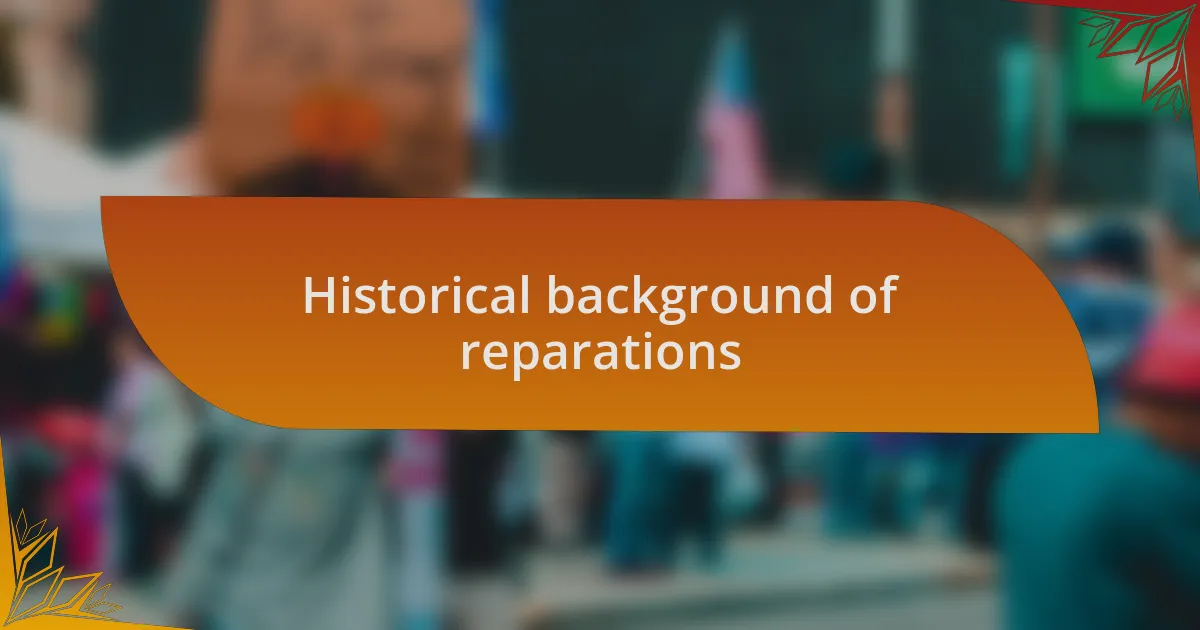
Historical background of reparations
Reparations have deep historical roots, tracing back to the transatlantic slave trade and the injustices faced by enslaved Africans and their descendants. I remember first learning about how countries like Germany have addressed Holocaust reparations, which sparked me to think: what does it really mean to atone for such deep-seated wrongs? This led me to realize that acknowledging history is just as critical as finding ways to offer restitution.
It’s fascinating to reflect on how reparations have also appeared in other contexts, such as land restitution for Indigenous peoples and compensation for wartime victims. These historical examples made me question whether current discussions on reparations are fully capturing the multifaceted nature of justice and healing. When I talked with peers about historical injustices, I noticed a mix of agreement and confusion, reinforcing the idea that our collective understanding of this topic is still evolving.
In my discussions, I often highlight the reparations movement in the United States, which gained momentum during the civil rights era. This history made me consider how many people are unaware of the ongoing debates and proposals today. When I shared this perspective with friends, I felt a combination of hope and frustration – hope for future possibilities and frustration at how the legacy of these inequalities still shapes our present lives.
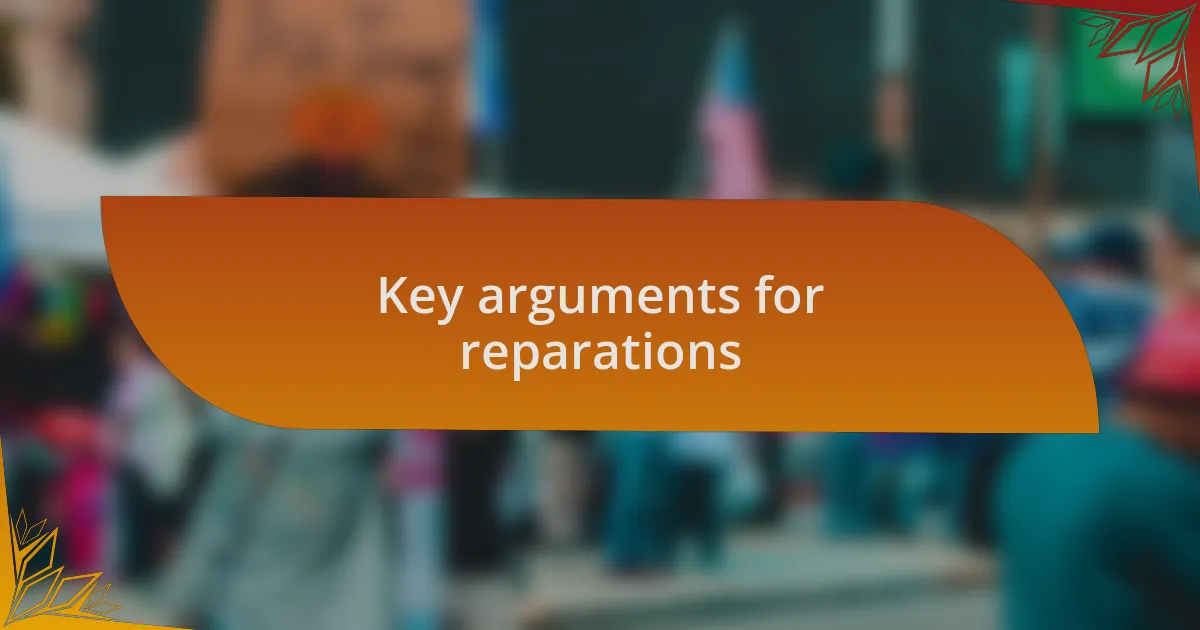
Key arguments for reparations
One of the most compelling arguments for reparations is rooted in the concept of justice. When I first engaged my peers in this conversation, I realized that many of us understood justice as a balance: a way to right historical wrongs. It seems only fair to confront the legacies of slavery, segregation, and systemic discrimination, not just to acknowledge pain but to actively work towards healing and equity. What better way to demonstrate accountability than through reparations?
Additionally, economic disparities trace many of their origins back to historical injustices. I recall discussing with a friend how wealth accumulation has been systematically denied to Black communities in America. As we unpacked this, it became increasingly apparent that addressing these economic gaps is essential for a fair society. I believe that reparations could pave the way for investment in education, housing, and health, ultimately fostering opportunities that have been historically denied.
Another significant argument centers on moral responsibility. I often share my thoughts on how societies have a duty to recognize their past actions and their long-term effects. It’s not just about what has happened, but how those events resonate today. I asked my peers during a recent discussion: Can we claim to be a just society without remedying the harms we’ve caused? That question lingered in the air, as many started to reflect on what true justice looks like in a modern context.
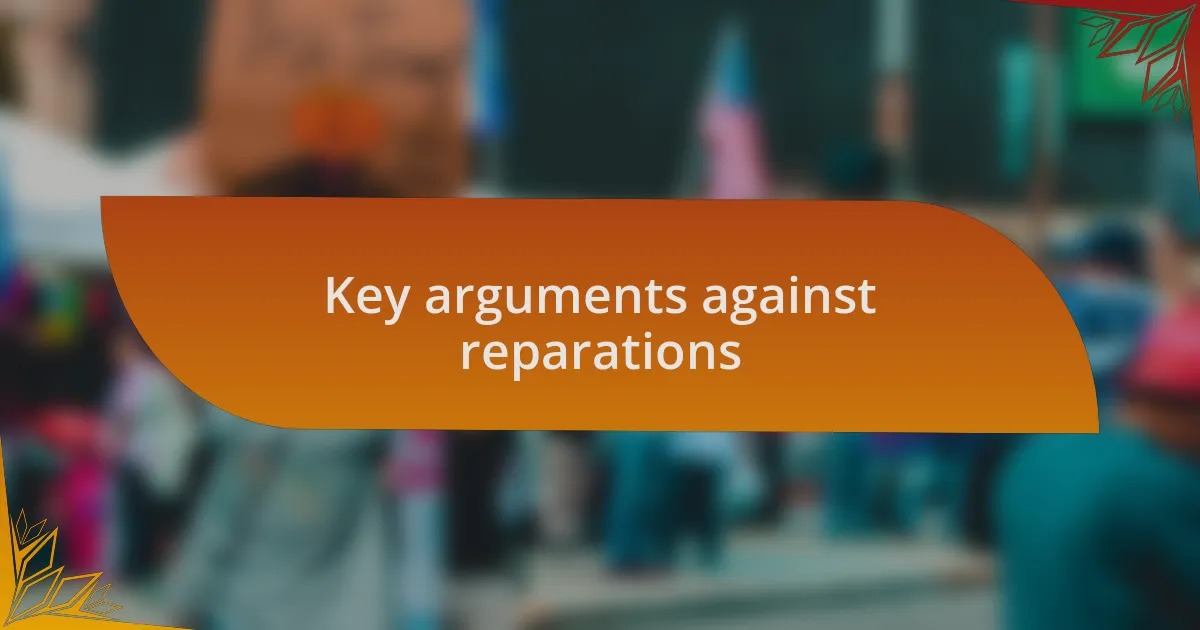
Key arguments against reparations
A common argument against reparations is the belief that it would create further division in society. When discussing this with a colleague, they voiced their concern about the potential backlash it could generate, suggesting it might deepen existing racial tensions rather than promote unity. I found myself pondering whether the fear of division comes from a discomfort with confronting uncomfortable truths, which is a hurdle we must overcome to achieve meaningful dialogue.
Some critics point to the idea of personal responsibility as a primary argument against reparations. During a conversation with a friend, they argued that individuals should not be held accountable for actions committed by past generations. This perspective often leads to the question: How do we balance acknowledging historical injustices with the belief in individual merit? I perceive this as a significant challenge that deserves more nuanced exploration, especially when one considers the systemic barriers many still face today.
Financial feasibility is another critical concern that often arises. In discussions with peers, some expressed doubts about where the funds for reparations would come from and who should be included in the process. This pragmatic view raises the question of whether we can find a workable solution that reflects historical realities and satisfies contemporary financial limitations. While I appreciate the need for careful considerations, I believe that the bigger picture of justice and equity might require innovative thinking beyond traditional funding models.
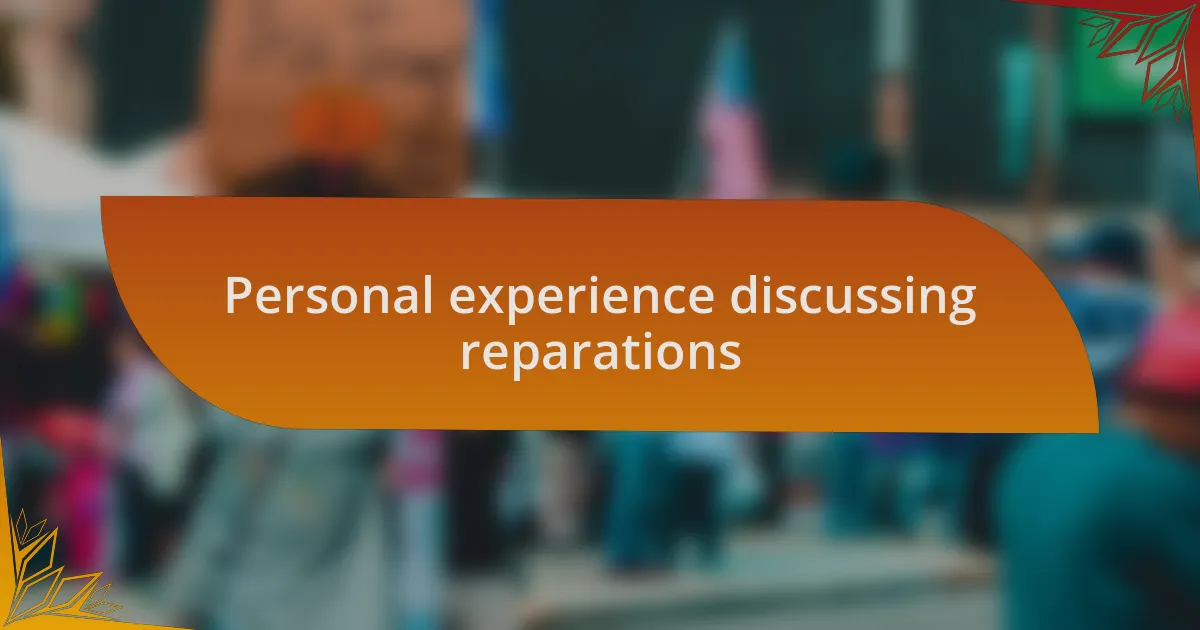
Personal experience discussing reparations
Discussing reparations with peers has been both enlightening and challenging for me. One memorable debate took place with a group of friends over coffee, where emotions ran high as we navigated feelings of guilt, anger, and hope. I could sense the struggle to reconcile our varying perspectives, and it made me wonder whether such discussions would lead us closer to understanding or simply rekindle old wounds.
At another gathering, a close friend expressed frustration over the concept of reparations, questioning why we should pay for the sins of our ancestors. This provoked a spirited exchange, where I shared my belief that understanding the historical context is crucial. It made me reflect on how often we shy away from uncomfortable conversations. Aren’t those the very dialogues we need to foster progress?
During a community forum, I experienced a moment of clarity when an audience member passionately articulated the need for reparations as a form of recognition and healing. Her words resonated with everyone in the room, prompting me to recognize the emotional weight behind the issue. That reinforced my belief that reparations are not just about monetary compensation; they symbolize a crucial acknowledgment of historical pain, which is the first step toward true reconciliation.
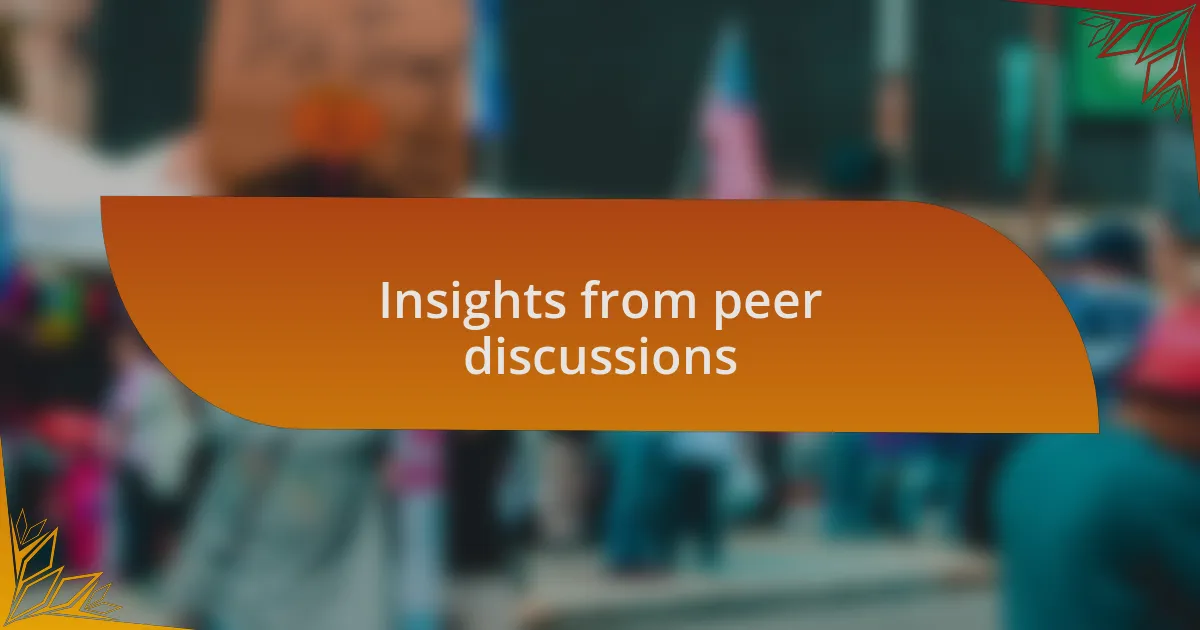
Insights from peer discussions
Engaging in discussions about reparations with my peers often revealed deep-seated emotions I never expected. At a recent gathering, one friend shared a heartfelt story about her ancestors and how their struggles shape her identity today. It struck me how personal narratives can shift perspectives and deepen our understanding. Can a simple story truly change how we view such a complex topic?
Another insightful moment emerged when we debated the potential impacts of reparations on social justice movements. I noticed that many friends felt apprehensive about diverting funds away from current inequities, which sparked a vibrant discussion about priorities in activism. I questioned whether reparations could coexist with ongoing efforts for equality, and the consensus seemed to center on the idea that both goals could be pursued collaboratively. Isn’t it fascinating how our fears often reflect a desire for a more just future?
There was also a particularly eye-opening experience during our dialogues about accountability. A peer urged us to consider how reparations might be framed not just as financial restitution, but as an opportunity to educate ourselves and others about systemic injustices. This notion made me ponder—aren’t reparations, in essence, a call to collective responsibility rather than just liability? The insights gained from these conversations challenged my views and opened up pathways for empathy and understanding, emphasizing that we’re all on this journey together.
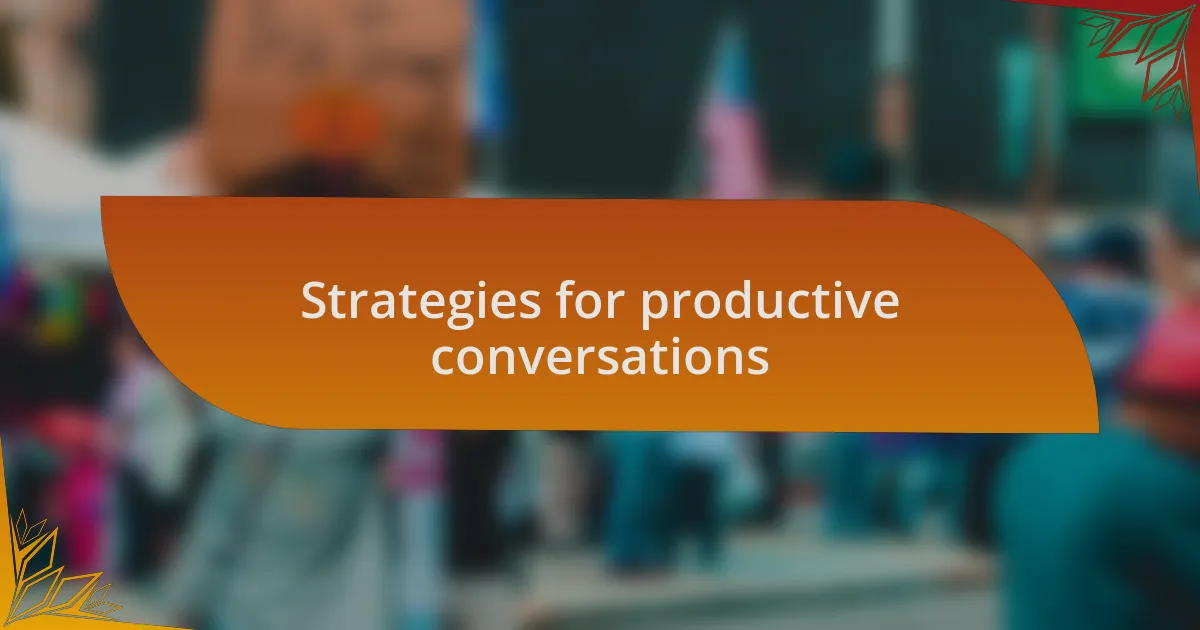
Strategies for productive conversations
Addressing such a sensitive topic requires creating a safe space for open dialogue. I remember a conversation where we all agreed to share our perspectives without interruption, allowing each voice to be heard. This simple strategy not only created a respectful atmosphere but also encouraged deeper reflections. Have you ever noticed how silence can give someone the courage to express their thoughts?
Another effective approach I found was to focus on shared values rather than disagreements. During one discussion, I highlighted our common desire for justice and equality. It was surprising how quickly we transitioned from arguing over differing opinions to exploring collaborative solutions. This shift reminded me that emphasizing unity can foster understanding, even when perspectives differ. Isn’t it powerful how finding common ground can transform the nature of a conversation?
Lastly, I learned the value of asking open-ended questions that invite exploration. I once posed the question, “What does reparative justice mean to you personally?” The wide range of answers revealed not only individual experiences but also a wealth of insights I hadn’t considered. This experience taught me that curiosity can be a profound tool for engagement and understanding, prompting more meaningful discussions. How often do we take the time to dive deeper into what others truly feel?